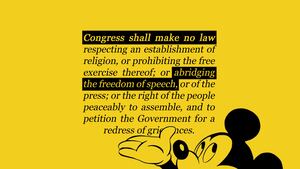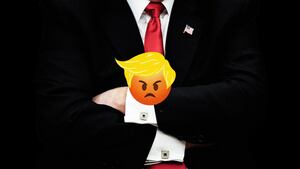Since the dawn of the commercial internet, Americans have spoken and accessed information online without providing their names.
Political dissidents freely express their views. Patients search for health information without fearing public embarrassment. Domestic violence victims seek help online, shielding their communications from their abusers.
State and federal lawmakers threaten to upend that culture of anonymity. And that should worry all Americans.
In March, Utah enacted a law that requires parental consent for children under 18 to use social media, and it requires platforms to “verify the age” of all Utah residents. In April, Arkansas passed a similar law, requiring social media companies to use “reasonable age verification.” And in Congress, a bipartisan group has introduced the Protecting Kids on Social Media Act, which requires social media platforms to “take reasonable steps” to verify users’ ages.
Age verification requirements endanger the ability of Americans to operate anonymously online, as the laws require the collection of information from everyone regardless of age. The statutes do not mandate a specific type of age verification; indeed, their vagueness on that point suggests that nobody quite knows how to meet the requirements without creating massive privacy problems.
The Utah law punts the issue to regulators, though it states that age verification can’t be limited to only government ID cards. The Arkansas law allows social media companies to determine what verification method is reasonable, and it includes a driver’s license as one such way of meeting the requirement. The federal proposal states that the age verification must be “beyond merely requiring attestation.”
Whether the verification is via government identification cards, facial scans, or other technologies, these laws encourage companies to amass information that could link the person’s identity to their social media activities. Companies simply have not found a magical solution that can both fully safeguard a user’s identity and verify their age with sufficient accuracy to meet the legal requirements.

As Shoshana Weissmann of R Street Institute recently wrote, the technology is “not ready for prime time” and “either lacks accuracy or deeply invades privacy.”
Defenders of such identification requirements might argue that people could still post and browse the internet without publicly disclosing their real names. But the mere collection of identifying information—either by an online service or its third-party intermediary—creates a link between users’ online activities and their names.
Even China, which requires social media users to register identifying information with its Ministry of Public Security, portrays the requirements as “foreground voluntary name, background real name.” But there is little doubt that critics of the government could be easily identified.
The laws and bills try to address concerns about unauthorized access by limiting the use and retention of age verification data. But anyone who has paid attention to the steady drumbeat of data breaches over the past decade knows that no company can guarantee the safety of personal information. A computer hack, poorly configured privacy settings, or a subpoena could quickly link the speaker and the name.
The states’ lack of concern for anonymity is no surprise. Debates about online harms often fuel calls for real-name requirements or other abrogations of anonymity. Although these proposals often are well intentioned, they ignore the prospect of silencing marginalized groups that do not have the luxury of speaking and receiving information under their real names. Free speech expert Jillian York aptly characterizes these proposals as the “White Man’s Gambit.”
Policymakers often point to bad actors who operate online anonymously, but this focus ignores both the trolls who post abhorrent content under their real names and the vulnerable people who could face retaliation and other harms if they used their real names.
As I describe in my recent book, anonymity and pseudonymity are deeply rooted in U.S. history, and foundational documents such as the Federalist Papers and Common Sense were not first published under the authors’ names. The reasons for seeking anonymity range from fear of persecution to more effectively communicating a message that is not bogged down with the author’s identity.
The Supreme Court has recognized the importance of anonymity, and more than a half-century ago ruled that the First Amendment provides strong protections for anonymous speech and association.
The Court first recognized a constitutional right to anonymity in 1958, blocking Alabama officials’ attempt to force the local NAACP chapter to disclose a list of its members. Since then, the Court has struck down laws that required pamphlets to list the authors’ names and an ordinance that forced door-to-door canvassers to register with the municipal government.
The Court traced this right to anonymity to America’s long history of anonymous speech. “The large quantity of newspapers and pamphlets the Framers produced during the various crises of their generation show the remarkable extent to which the Framers relied upon anonymity,” Justice Clarence Thomas wrote in a 1995 concurrence.
Two decades ago, courts began applying these anonymity values to the internet by setting a high bar for plaintiffs who sought to use subpoenas to unmask the identities of anonymous online posters. “The right to speak anonymously extends to speech via the Internet,” a Washington state federal judge wrote in a 2001 order quashing such a subpoena. “Internet anonymity facilitates the rich, diverse, and far ranging exchange of ideas.”
The First Amendment restricts government action, so it would not prohibit a company from voluntarily requiring its users to provide identifying information. Indeed, Facebook has long had a real-name requirement (one that has rightly received substantial criticism). But serious First Amendment problems arise if a state or federal law requires those companies to collect identifying information.

Another attempt at protecting children online—the 1996 Communications Decency Act—caused the Supreme Court to forcefully state that the First Amendment applies to the internet. In 1997, the Court struck down the law, which restricted the online transmission of “indecent” and “patently offensive” material to minors.
And courts have recognized the harms of eroding anonymous online speech, even when the law is intended to protect children. In 1998, New Mexico passed a law that restricted the dissemination of “harmful” online material to minors. Among the defenses provided in the law was the use of identity verification. And the implications of this defense for anonymity were among the reasons that New Mexico federal judge Curtis Hansen struck down the law.
“Requiring a credit card, debit account, adult access code, or adult personal identification number before providing access to speech on the Internet would bar many adults who lack such identification from access to information appropriate for them,” wrote Hansen, who was affirmed by the Tenth Circuit. “Requiring age verification before providing access to speech on the Internet would bar many people from accessing important information—such as gynecological information—anonymously.”
The state laws do not go so far as to explicitly require credit cards, drivers’ licenses, or other identity verification, as they fail to specify how an online service might meet the age estimation requirement. But that uncertainty is precisely the problem.
Website operators that want to avoid costly regulatory actions likely will collect sufficient data to show that they have certainty in their age verification. And that data—whether driver’s licenses, facial scans, credit card numbers, or something else—will erode users’ anonymity.
I do not mean to downplay the legitimate concerns about the harms of social media for teenagers. And the First Amendment right to anonymity is not absolute. But I doubt that age verification requirements are effective enough to survive a constitutional challenge. If there is any possibility of dodging an identification requirement, there is a good chance that determined teenagers will figure out how to do so. Yet millions of other social media users who play by the rules will have no choice but to turn over their personal information.
Despite its importance throughout U.S. history, anonymity is too often forgotten in discussions about privacy and online harms. The courts should strike down these laws and allow people to continue to separate their identities from their online activities.










